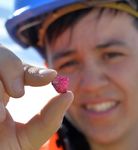The Extraordinary Challenge of Coloured Stones - CIBJO
←
→
Page content transcription
If your browser does not render page correctly, please read the page content below
COLOURED
STONE
COMMISSION
The Extraordinary Challenge
of Coloured Stones
By Charles Abouchar, President The session had been organised by CIBJO together with
CIBJO Coloured Stone Commission the Responsible Jewellery Council, and moderated by
Anne-Marie Fleury, RJC’s Standards and Impacts Director.
A
special session on the integrity of the coloured As she explained, the council was conducting a study, with
gemstone sector supply chain, organised last the goal of developing ethical social and environmental
November during the first day of the 2017 CIBJO practices for the coloured gemstone sector, which would
Congress in Bangkok, Thailand, set the tone for a great deal complement its Code of Practices already in place for
of discussion during the months that followed. diamonds and precious metals.
CIBJO SPECIAL REPORT 2018
COLOURED STONE COMMISSION
PAGE 1CIBJO Special Report
The decision to address the challenges posed by the
coloured gemstone sector at this later stage was not
coincidental, and stems mainly from the significant structural
differences between it and the diamond and precious metals
businesses. With diamonds, approximately 90 percent of
the rough coming into the market is produced by just six
companies, and gold mining is also dominated by major
corporations. On the other hand, in the coloured gemstone
sector there is only one large producer operating multi-
nationally, and even its market share and geographical
reach are relatively limited. More than 80 percent of rough
coloured gemstones that come into the pipeline is produced
by tens of thousands of artisanal miners, at a great many
small-scale mine sites around the world.
But it is not only the logistical difficulties that make the Charles Abouchar, President of the CIBJO
coloured gemstone sector such a tough nut to crack. The Coloured Stone Commission.
potential of an overly cumbersome responsible sourcing
system having unintended consequences is also a critical June, where CIBJO, the International Coloured Gemstone
factor. Policies that could economically disadvantage Association (ICA) and the American Gem Trade Association
artisanal or small-scale miners, by restricting their ability to (AGTA) resolved to create a joint policy document which
be fully involved in the business, could place at risk literally would outline responsible practices for the global coloured
millions of ordinary people whose lives and communities are gemstone sector.
currently supported by gemstone mining. The project is still ongoing, but following the meeting
Speaking from the audience during the session in Bangkok, CIBJO produced an internal paper to frame the World
the noted ruby and sapphire expert Richard Hughes alluded Jewellery Confederation’s position. It began by defining
to the high stakes that are involved. “Don’t harm the people the term “responsible practices,” which it expressed as the
you want to regulate,” he stated. steps necessary to ensure that gemstones are sourced from
ethically responsible suppliers, taking reasonable measures
A GLOBAL POLICY FOR RESPONSIBLE PRACTICES to mitigate any negative social, economic and environmental
Supply chain integrity was one of the key subjects on the impacts that may result from the mining, processing and
agenda of a meeting held at the JCK Show in Las Vegas in trade of gemstones. Responsible practices, it added, must
Emmanuel Piat, Vice President of the CIBJO Nilam Alawdeen, Vice President of the CIBJO
Coloured Stone Commission. Coloured Stone Commission.
CIBJO SPECIAL REPORT 2018
COLOURED STONE COMMISSION
PAGE 2CIBJO Special Report
also include measures to ensure positive impacts on the Apprehension had been expressed during the meeting
lives and wellbeing of the communities and countries where in Las Vegas concerning existing stocks in the coloured
gemstones are produced and processed, helping create gemstone sector following the introduction of an industry-
sustainable economic and social opportunities at the grass- wide responsible practices system. Many companies, it
roots level. was noted, have been holding onto merchandise that they
In its position paper, CIBJO insisted that to the greatest originally purchased years and sometimes decades ago. The
degree possible any measures proposed to promote CIBJO position paper recognised this phenomenon, stating
responsible practices should not unreasonably disadvantage that the proposed responsible sourcing document should
smaller and medium-sized enterprises, nor should it handicap not disadvantage historic inventories.
certain gemstones because they are mined and handled The position paper additionally noted that, while CIBJO
exclusively by companies managed by artisanal miners. does not provide responsible sourcing certification, nor
does it endorse the system of any international standards
A CODE OF BEST PRACTICES IS REQUIRED organisation, it recognises the right of individual companies
The systems developed in the diamond and precious metals and organisations to seek certification by such bodies,
sectors include chokepoints, which are stages in the chain of among them the Responsible Jewellery Council, including
distribution through which almost all merchandise passes, third-party auditing. CIBJO will work with bodies like RJC to
allowing them to serve as junctures where the goods can be try and ensure that the systems that they apply recognise the
independently monitored. In the diamond sector these are unique challenges and difficulties faced by members of the
represented by the national authorities operating within the coloured gemstone sector.
Kimberley Process system, and in the precious metals sector In CIBJO’s opinion, while it would not necessarily be the
these tend to be the smelters. obligation of the representative organisations endorsing
But in the coloured stones sector, the CIBJO position the joint responsible practices document to police and
paper recognised that, currently, with the range of different enforce compliance among its members, in the event of any
gemstones and the number and geographic diversity of demonstrable gross violation of the document’s provisions by
gemstone miners, the creation of industry-wide chokepoints an individual or company, and following proper judicial due
is objectively an impossible task. The joint responsible process by a recognised body, the relevant representative
practices document agreed to by CIBJO, ICA and AGTA, it organisation should be prepared to take appropriate
therefore states, should represent a code of best practices, measures against that member, including suspension and/or
demonstrating a commitment to integrity in the supply expulsion from its ranks.
chain, to the best ability of each individual participant. CIBJO is currently in the process of formulating a Responsible
CIBJO SPECIAL REPORT 2018
COLOURED STONE COMMISSION
PAGE 3CIBJO Special Report Sourcing Guidance for all jewellery and gemstone industry participants, including members of the coloured gemstone sector. It will be presented at the CIBJO Congress in Bogotá. These guidelines would not replace or contradict the joint responsible practices document being worked upon by CIBJO, ICA and AGTA, but rather would encompass it, and place it in the context of other responsible sourcing codes being implemented elsewhere in the greater jewellery and gemstone industry. FTC GUIDELINES FOR COLOURED GEMSTONES The revision of the Guides for the Jewelry, Precious Metals, and Pewter Industries, released by the U. S. Federal Trade Commission in June contain a number of rules that are specific to the coloured gemstone sector in the United States. The proper disclosure of composite gemstone products, which has been the subject of considerable discussion within CIBJO, and relates to items made with gemstone material and any amount of filler or binder, such as lead glass, is addressed in this edition of the FTC guides. The latest version expressly prohibits such products from being referred to with an unqualified gemstone name, and further states [gemstone]” and/or “manufactured [gemstone].” Over and that calling them “treated [gemstone]” does not adequately above that, they should be clearly and conspicuously be disclose the true nature of the product. It similarly forbids qualified as not having the same properties as the actual products with any amount of filler or binder from being gemstone referred to. called a “laboratory-grown [gemstone],” “laboratory-created A new section appears in the FTC guides, which advises [gemstone],” “[manufacturer name]-created [gemstone]” or marketers that it is unfair or deceptive to mark or describe “synthetic [gemstone].” any gemstone with incorrect varietal names. Thus, terms like The recommended terms for such materials provided “yellow emerald” to describe golden beryl or heliodor, or by the FTC guides are “composite [gemstone],” “hybrid “green amethyst” to describe prasiolite are now prohibited. CIBJO SPECIAL REPORT 2018 COLOURED STONE COMMISSION PAGE 4
CIBJO Special Report
But the new version removes a prohibition that had been growing range and sophistication of treatments and artificial
listed in the previous edition of guides that stated that it products, it has over the years has become increasingly
is “unfair or deceptive to use the word ‘gem’ to describe, detailed, technical and difficult for the layperson to navigate.
identify, or refer to a ruby, sapphire, emerald, topaz, or other Cognizant of this, the CIBJO Coloured Stone Commission
industry product that does not possess the beauty, symmetry, decided at the 2017 CIBJO Congress in Bangkok, Thailand,
rarity, and value necessary for qualification as a gem.” to develop a simplified version of the book. It is not meant
The revised FTC guides state that marketers of man-made to replace the original, but rather to serve as an abridged
gemstones may use the word “cultured” to describe their guide that the average retailers and their staffs can more
products, on condition that they clearly and conspicuously easily understand and use regularly. It is a document that
add descriptive terminology that communicates to consumers would be more simple to translate into multiple languages.
that they are not a mined stones. These other descriptors In the process of achieving this, a second guide called “Dos
could be “laboratory-grown,” “laboratory-created” and and Do Nots” is being drafted by CIBJO’s Sector A, for all
“[manufacturer name]- created.” gem-related products, providing a simple overview for the
The revised FTC guides retains its prohibition of descriptors retail trade. It is designed to help people avoid making basic
like “real,” “genuine,” “natural,” “precious,” “semi-precious” mistakes when selling mounted or unmounted diamonds,
and similar terms to describe synthetic and other artificial coloured gemstones, pearls and related artificial products.
gemstones. When approved for publication, we hope that these
The Coloured Stone Commission will carefully look into the new documents will assist the user to better promote
changes made in the FTC Guides to determine if or how they and sell gem-related products, and in so doing elevate the
may affect the CIBJO rules. Nonetheless, it must be made importance of all the Blue Books produced by CIBJO.
clear that CIBJO represents the global trade in its entirety,
will act to best protect the interests of everyone concerned. SEPERATING FACT FROM OPINION
Not all information appearing on a gemstone
A SHORTER AND SIMPLER BLUE BOOK gemmological report is necessarily accurate. Factors
The CIBJO’s Gemstone Book is the most universally- separating reports issued by different laboratories, when
recognised guide to rules, regulations, standards and presented with the same evidence, generally are related to
nomenclature in the coloured stone sector. But with the instances when professional opinions are called for.
CIBJO SPECIAL REPORT 2018
COLORED STONE COMMISSION
PAGE 5CIBJO Special Report
Take, for example, colour descriptions. They often are
given commercial names like “Pigeon Blood,” “Royal Blue,”
and “Cornflower Blue.” No definitive scientific definition for
these colours exist, meaning that the decision to describe
colours in rubies or sapphires using these descriptors is
determined by the individual laboratories, based on their
own guidelines and experience. This often leads to confusion
and sometimes even misrepresentation.
A similar issue is encountered when it comes to estimating
the volume of filler material infused into emeralds and other
gemstones. Since exact measurement cannot be provided, it
becomes a personal judgement, and so again a professional
opinion by the laboratory issuing the report. The same is
often the case when country of origin is listed.
In an effort to achieve more transparency, the CIBJO
Coloured Stone Commission has been working together with
the CIBJO Gemmological Commission to study the possibility
of objectively separating scientific results from professional
opinions on laboratory reports. We hope that once
gemmological laboratories accept this practice, consumers
will better understand that parts of a report reflect the
opinion of the issuing laboratory, and that such opinions
may differ from one laboratory to another. This topic will
be discussed at length at the forthcoming CIBJO Congress in
Bogotá.
PHOTO CREDITS
Cover photo by Vincent Pardieu for Greenland Ruby.
Page 3 photo by Muzo Emerald Colombia.
Page 4 tourmaline photo by Angelsover on Pixelbay.
Page 4 amethyst photo by Carole Smile on Unsplash.
Page 5 photo by Muzo Emerald Colombia.
Page 6 photo by Muzo Emerald Colombia.
ALL RIGHTS RESERVED
© CIBJO, The World Jewellery Confederation, 2018
www.cibjo.org
CIBJO SPECIAL REPORT 2018
COLORED STONE COMMISSION
PAGE 6You can also read


























































